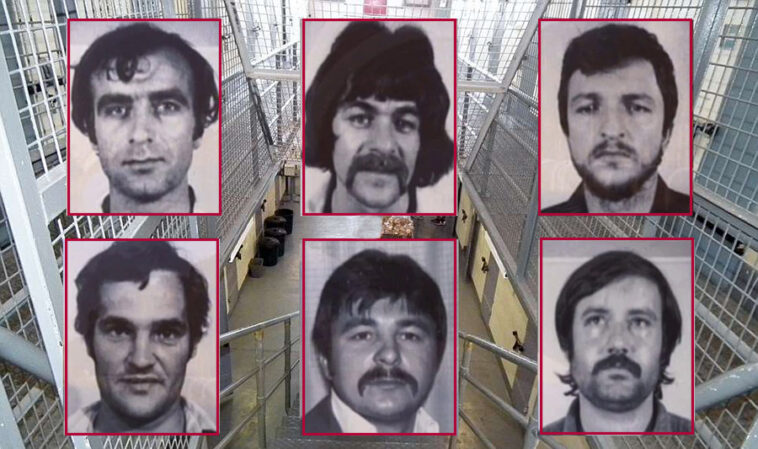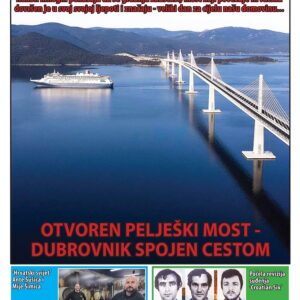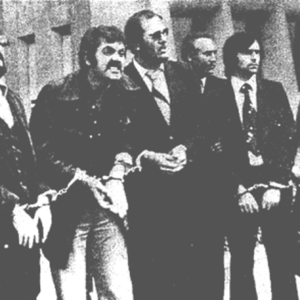Vrhovni sud NSW-a odredio je suca Robertsona Wrighta da odluči treba li se održati sudska revizija osuda hrvatske šestorice, od kojih je svaki dobio 15-godišnju zatvorsku kaznu 1981. zbog navodne sudjelovanja u bombaškoj zavjeri.
Sydneyjski odvjetnik Sebastian De Brennan i odvjetnica Helen Cook, oboje djelujući pro bono, prijavili su se početkom prošle godine za reviziju u ime trojice hrvatske šestorke – Vica Brajkovića, Maksa Bebića i Mile Nekića, koji su sada svi u 70-ima.
Sudac Wright donijet će svoju odluku nakon ispitivanja De Brennanovog argumenta, protupodneska Ureda krunskog odvjetnika NSW-a koji tvrdi da revizija nije opravdana, povratka na De Brennanov argument i nedavno još jednog krunskog argumenta. Transkripti suđenja također su teška literatura: oko 5000 stranica u 20 tomova, koji su srećom digitalizirani.
The NSW Supreme Court has designated Justice Robertson Wright to decide whether a judicial review should be held into the convictions of the Croatian Six, who each got a 15-year gaol term in 1981 for their alleged part in a bombing conspiracy.
Sydney barrister Sebastian De Brennan and solicitor Helen Cook, both acting pro bono, applied early last year for the review on behalf of three of the Croatian Six – Vic Brajkovic, Maks Bebic and Mile Nekic, who are all now in the 70s.
Justice Wright will make his decision after examining De Brennan’s argument, a counter submission by the NSW Crown Solicitor’s Office arguing a review is not warranted, a comeback to that by De Brennan, and just recently a further crown argument. The trial transcripts are heavy reading too: some 5000 pages in 20 volumes, which fortunately have been digitised.
It may now be months before Justice Wright comes to his conclusions and writes them up. If he recommends a review, it will likely take place something like a court appeal, with senior counsel briefed by both the three Croatian Six men, by the state and possibly other interested parties.
The new application for review is partly based on new evidence revealed in the 2019 book Reasonable Doubt: Spies, Police and the Croatian Six by veteran journalist Hamish McDonald, a former foreign editor of The Sydney Morning Herald.
McDonald applied to ASIO via the National Archives of Australia for its file on the mysterious crown witness, Vitomir Misimovic, a Serb from Bosnia who pretended to be Croat named Vico Virkez and infiltrated anti-Yugoslav groups in NSW.
The ASIO files show that for about six months before Virkez claimed to “blow the whistle” on the alleged bomb plot by reporting it to the Lithgow Police Station, setting off a chain of arrests across Sydney, the agency was monitoring his contacts with a suspected UDBa officer at the Yugoslav Consulate-General in Sydney.
After the arrests on 9 February 1979, ASIO passed this information to the NSW Police. ASIO telexes show then NSW Police assistant commissioner Roy Whitelaw expressing great alarm. If this got out to the “opposition” [that is, the defence lawyers], he told ASIO, it would “blow a hole right through the police case”.
This piece of crucial evidence was withheld throughout the nine month-long trial with the crown counsel or prosecutor, the late David Shillington QC, assuring the jury there was “not a skerrick of evidence” that Virkez was a Yugoslav intelligence agent. The application for review is understood to argue this withholding of relevant evidence created a miscarriage of justice.
The case has long been controversial, not only among Croatian-Australians who feel it was a false-flag operation by the UDBa to taint the entire community as extremist, but also in wider circles, many of whom were concerned this case represented foreign meddling in Australia’s judicial system.
On two previous occasions, the state has been asked to review the convictions.
One was after ABC Four Corners reporter Chris Masters found Virkez in his Bosnian village in 1991 and got this principal crown witness to admit on camera that he had fabricated his evidence of the bomb plot.
The subsequent application was rejected in 1994 by then attorney-general John Hannaford, on advice by government lawyers Keith Mason QC (later solicitor-general) and Rod Howie QC (later a Supreme Court justice). This advice is still held secret under legal privilege.
The second application was in 2012, bringing together new perspectives: the research by US intelligence expert John Schindler into the covert war of the UDBa against overseas activists; revelation by former federal government lawyer Ian Cunliffe that crucial intelligence information that might have swung the verdict had been withheld from the trial; and the Wood Royal Commission report in 1996 that found systemic corruption and abuse of process in the NSW Police detective squads and Special Branch.
This application too was rejected by then acting justice Graham Barr, appointed by former chief justice Tom Bathurst. He ruled that whatever the involvement of Virkez with Yugoslav, intelligence, the Croatian Six had all in his words, “confessed”.
That most of the confessions came in the form of unsigned ‘verbals’ after some hours of heavy questioning at the old CIB headquarters behind the Central Court – and one, allegedly by Brajkovic, had been thrown out by the trial judge because of evidence Brajkovic had been severely bashed, did not sway Barr. He declared that present-day standards such as the need for recording of police interviews and access to lawyers could not be applied retrospectively.
Justice Wright has been in the Supreme Court for nine years, after a career as barrister that started with first-class honours degrees from Sydney and Cambridge universities. The case will be new ground for him, as his specialities so far have been competition law, consumer protection, financial regulation and administrative law.
NSW chief justice, Andrew Bell has now diverted him into questions of criminal law and espionage, as shown in the ‘colourful’ milieux of the state’s police during 1979-81, the Croatian diaspora, NSW Special Branch and ASIO being outmatched by Belgrade’s UDBa.
A decision on Justice Wright’s review is expected by the end of this year.




